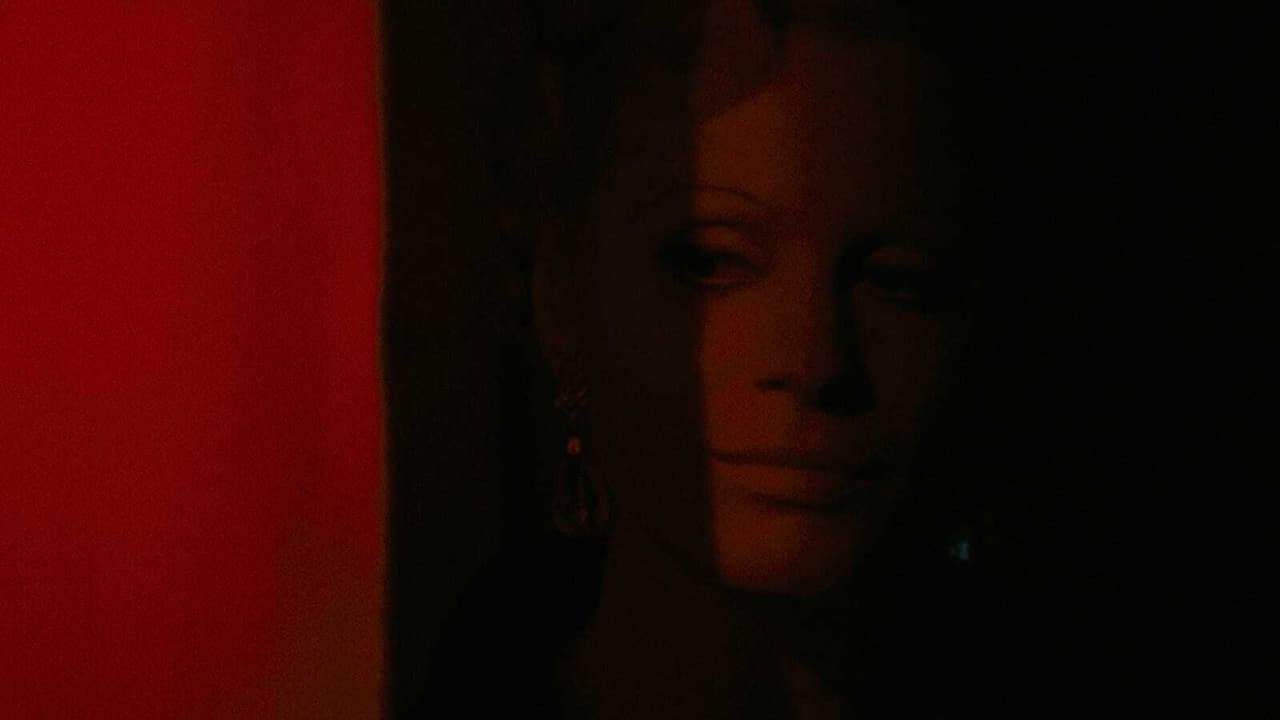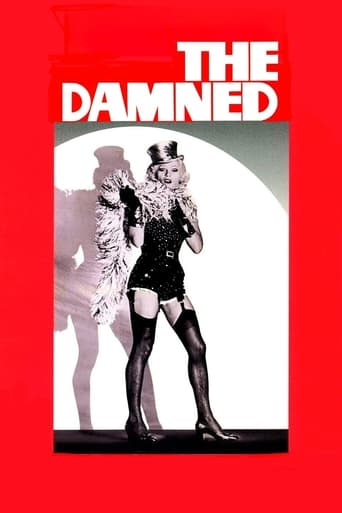

"The Damned" is pretty much what I expected from a Luchino Visconti epic from the 1960s...it's very long, very slow and very mannered. However, unlike some of his other tediously long films ("The Leopard" and "Death in Venice", it is more watchable...possibly because it's so perverse.The film is about a rich industrialist family in Nazi Germany during the early years (1933 or so onward towards WWII). At the beginning, they seem relatively normal though over the course of the film, these conniving and avaricious folks sell their souls to the Nazi regime in order to maintain power and financial success. In the process, some get wrapped up in the SA (and are eventually destroyed), rape, incest (multiple times), cross-dressing and more...until by the end of the film most of them are dead and the remaining family member is a soul-less ghoul of a man.The story is a decent overview of the German industrialists in general. They were an evil lot who profited tremendously from the build up to the war. Plus, unlike most WWII films, you really see nothing of the country except life for this family. So, the persecution of Jews, Hitler's seizing power and much more are only mentioned in the film as opposed to being directly dealt with in the story. This was NOT a bad thing and makes the film very unique. What also is unique is how incredibly perverse everyone is. There is a lot of nudity...some of which is quite incestuous and kinky. So, it's clearly NOT a film to show the kids or your mother or Reverend Jenkins!Another important thing I must mention is the slowness of the film. It is NOT a movie the average person would enjoy and that is a trademark of many of Visconti's later films. This isn't so much a criticism but an observation. I much prefer his earlier work (such as "Rocco and His Brothers") but many seem to like his slow epics. To each his own....but like his other films, "The Damned" might have been better with a bit of editing and tightening up of the story.
... View MoreTo add a detail to the previous reviews, the subplot involving Martin and the little Jewish girl is taken from Dostoevsky's "The Demons". In the novel, it plays an important role. Here, it gets diluted in a constant stream of horrors that left me numb instead of outraged. The movie is ambitious, for sure: the lenght, the elaborate lighting, the Wagnerian music and furnace images scream that the director has intended to shoot a statement on Nazism and a master-piece of cinema. However, it is not historically accurate or even enlightening. Some Nazi officials have become perverted or have always been perverted. The leaders, however, and the civil servants have just adapted their normal life-style to the new order, even if it involved murder. This is the scary part: the feeling that the line between "nice" people and criminals was blurred for a moment, out of conformism or lack of insight.
... View MoreThe Damned tells the story about the Nazi consolidation of power from the Reichstag fire of 1933 through the famous Night Of The Long Knives purge in 1934 as seen through the eyes of a prominent German industrial family, the Von Essenbachs. The Von Essenbachs are a Prussian Junker clan who survived World War I with fortune intact. They are a munitions manufacturing outfit based on the real life Krupps and in order to survive the Great Depression and the coming Nazi preventive counterrevolution they make a deal with the new Third Reich.As we know from history the Nazis manufactured an incident with the famous Reichstag fire to spread fear and create the climate for the new Chancellor Adolph Hitler to assume dictatorial powers. The next year was a struggle for power within the Nazi movement as well as the country. The Von Essenbachs have their own power struggles with in the family that parallel the Nazis and the country.Luchino Visconti based some of his characters on some real life German personalities of the day. Dirk Bogarde is based on Hjalmar Schacht the finance minister who in fact was a technician and who did in fact play a large role in German recovery from the Depression. Bogarde is a new man brought in to reorganize the munitions factory and who like Schacht thinks he can ride the tiger. Swedish actress Ingrid Thulin plays the daughter of the patriarch of the clan Albrecht Schoenhals. She's one vicious woman who has bought completely into the Nazi ideology. I believe she's based on Joseph Goebbels wife Magda, one of the most terrifying women in history. Though the two of them indulged in many affairs, they were committed partners in support of Hitler. Magda Goebbels was a woman who along with her husband so couldn't stand the thought of Germany losing World War II and her children living under Russian/Slavic occupation that she and Joe killed their seven kids as well as themselves. One of the sickest people in history and I can definitely see Thulin doing the same thing in the same circumstances.The Damned was nominated for an Oscar in 1969 for Best Original Screenplay, it lost to the more popular Butch Cassidy And The Sundance Kid. As much as I like Newman and Redford this story is far better. Sadly this was the only nomination for the film, incredibly not even nominated for Best Foreign Film.As Visconti states in the film Nazism may have been born with Hitler and discontented veterans of World War I, but it was incubated in the factories of Germany during the Great Depression. It was fed to the workers by the owners who were in terror of a Communist revolution. In many ways the Nazi takeover was a preemptive strike against that occurring, but it was a horrible price.
... View MoreVisconti's epic allegory of a wealthy murdered German patriarch, his family and their uneasy relationship with the Third Reich is wonderfully well-intentioned, magnificently overblown and almost a masterpiece. Where Kurasawa adapts Shakespearean themes and transposes their themes as far-reaching and relevant to different worlds, Visconti takes elements of Macbeth and Hamlet bludgeoning them into his tale of a dynasty seemingly aware of drastically uncertain times and powerless to do anything but react in outlandishly vicious and self-protective defence. The storyline embracing full-blown homosexual orgy, incest, transvestism, and paedophelia as portrayal of Nazi depravity is never subtle but always magnetic. A piece so verbose is of course massively flawed. The dialogue, although delivered in English is at times illegible and the discrepancy between actors enjoying themselves (a resurgent Ingrid Thulin, an ecstatically hammy Dietrich-impersonating Helmut Berger) and actors sweating and morose in their discomfort (a visibly hard-working Dirk Bogarte) is noticeable. Visconti's zoom lenght shots to portray (very obvious) evil have long been rendered obsolete by television and simply add to the general sense of chaos.In truth however it remarkably adds to the joyous uncertainty of events and as the movie sinks almost overwhelmed to its conclusion, it ultimately survives for its hypnotic splendour.
... View More